- Home
- Philip Pullman
Two Crafty Criminals! Page 5
Two Crafty Criminals! Read online
Page 5
Then there was a satisfied sigh, and then another, and Uncle Paddy said, “That was a fine piece of bacon, Michael.”
“A happy pig, Patrick,” said Uncle Mikey, and Thunderbolt saw a secret wink pass between them.
Mrs. Malone cleared the bacon away and sliced up some bread and treacle for everyone, and then Bridie washed the dishes. Thunderbolt wondered when she was going to broach the subject of Benny’s plan, but she knew her uncles; she waited until they’d got their pipes going and the kids were playing at their feet.
When she’d done the dishes, she said, “Uncle Mikey? Can ye do us a favor?”
Uncle Mikey didn’t live there; he was visiting from Limehouse, where his barque was unloading.
“As long as it’s tomorrow. We’re back off to the Baltic Sea the day after. What d’ye want me to do?”
“You and Uncle Paddy both. Ye’ve got to go into Rummage’s and walk around till you see Mr. Rummage himself. Then ye’ve got to mention snide money and see if he pricks up his ears. If he comes close and listens, ye’ve got to talk about slummin’.”
“What the divil’s that, then?” said Uncle Paddy.
“Hush, Patrick; this is a prime lark,” said Uncle Mikey. “Carry on, girl.”
“One of ye’s got to tell the other that what professionals do with new snide coins is to rub a mixture of lampblack and oil into ’em to make ’em look used. Otherwise they look too new and people get suspicious. Just make sure old Rummage hears that and then walk away casual-like. See?”
Uncle Mikey raised his ginger eyebrows and directed a long stream of smoke at the ceiling.
“I can’t imagine what this is all about, but I wouldn’t mind playing a trick on that great swaggering gomus,” he said. “What d’ye say, Paddy?”
“Well, why not?” said Uncle Patrick.
And Thunderbolt felt as pleased as if both uncles had belonged to him.
The next morning Thunderbolt intended to find Dippy at once, but unfortunately the school attendance officer was standing in the street with his little black notebook, and there was no escaping him. At playtime, Thunderbolt had a brief and almost absentminded fight with a boy who said that Mr. Dobney would certainly be hanged and then Thunderbolt would have to go to the orphanage; and once he’d successfully mended his glasses with a piece of string from his emergency lasso, he settled down resignedly to learning the principal rivers of England and Wales. The drone of the master—the sniffing and scratching and fidgeting and the other kids—the stuffy fug that always developed when a lot of dirty bodies shared a close space with a big iron stove—all enveloped him with gloom.
As he trudged out of the BOYS gateway at four o’clock, he heard Benny yell “Thunderbolt!” from across the street and saw him jumping up and down with impatience, beckoning him frantically.
He darted across.
“They done it!” Benny said. “Bridie’s uncles! They went in looking like a pair of swells, and they waited till Rummage was this far away, and when they started talking about snide money he jumped so much he nearly snapped his suspenders!”
Thunderbolt’s gloom began to lift. “The trouble is, I ain’t had time to find Dippy,” he said. “The attendance officer nabbed us and I couldn’t escape.”
“Oh, blimey. He could be anywhere. If we don’t get him in there tonight, we’re sunk!”
“I been wondering how to tell him anyway.”
“Me too. I suppose the twins might know where he is …”
The Peretti twins, Angela and Zerlina, were a year or two younger than the others. They had attached themselves to the New Cut Gang some time ago, and for all Benny’s scorn of kids (apart from Sharky Bob), he had a healthy respect for their sharp wits, not to mention their ferocity. You wouldn’t think they were fierce to look at them—they looked like little Italian angels, with big innocent brown eyes and masses of black curly hair—but when they were roused, they were worse than African Sam, whose temper was legendary.
And more to the point, Dippy was fond of them. They might be able to persuade him even if the boys couldn’t.
“Yeah,” said Thunderbolt. “Good idea.”
The two boys set off like greyhounds. They found the twins arguing with Snake-Eyes Melmott, the bookie, outside the Welsh Harp, dragged them away, and told them the whole story in fifty seconds flat.
“Right!” said Angela. “We’ll find him.”
“We’ll make him do it if it’s the last thing he does,” said Zerlina.
They raced up and down the New Cut, and along Lower Marsh, and saw a hot-pea man and a muffin man and a pieman, but no Dippy. Then they charged up one side of Waterloo Road as far as the railway bridge and down the other as far as St. George’s Circus, and then back up again, and finally they ran into him coming out of Chippin’s, the greengrocer’s, on the corner of Webber Row.
“Dippy! Listen—”
“Dippy, you got to do summing for us—”
“You gotta be a public benefactor!”
“It’s heroic, Dippy, and only you can do it!”
Dippy blinked at them suspiciously.
“Wot?” he said.
“It’s easy, honest,” said Thunderbolt, tugging at his sleeve.
“I’ll push yer stove for yer, Dippy,” said Benny.
Dippy feebly allowed the twins to lead him along the crowded pavement behind his hot stove.
“But …,” he said.
“There’s nothing to it, Dip,” said Angela. “It’s not as if we’re asking you to shin up a drainpipe or crawl through a sewer—”
“Or get shot at or stabbed—” said Zerlina.
“Or hanged, or poisoned,” said Benny. “Or suffer the Death of a Thousand Cuts, like that bloke in the Waxworks.”
They didn’t stop talking until they reached Clayton Terrace. They parked Dippy’s stove in the backyard and went into Thunderbolt’s kitchen, where Bridie was waiting by the light of a candle with scissors and flour and rouge and a jar of dripping.
“Woss this all about, then?” said Dippy, profoundly suspicious. “Woss that dripping for?”
“Yer hair, of course!” said Bridie. “It won’t lie flat on its own, and we can’t afford proper macassar oil. Now sit down and—”
He goggled.
“Me hair?”
“And the flour’s for yer cheeks—No! Don’t let him run away! Sit down, Dippy. Do as ye’re told!”
Since she had a pair of scissors in her hand, and since she was her mother’s daughter, he sat down at once. The twins held him down while she worked on him. Benny, meanwhile, was taking a suit out of a bag. He’d borrowed it from his father’s workshop, since the customer it was being altered for had to go away rather suddenly for his health, so he obviously didn’t want it. Benny shook it out with practiced hands, swung it this way and that to admire the nap of the cloth, and brushed a fleck or two of dust from the black shoulders.
While he was doing that, Thunderbolt polished his father’s best pair of boots. Mr. Dobney had great big feet, so Dippy was bound to be comfortable in them.
“You’re going to look like the Duke of Clarence,” said Benny admiringly.
“I hope not,” said Dippy. “He’s dead.”
“Well, before he was dead. Nice schmutter, this. Look at the cut, eh!”
“I wish I knew what you was doing,” Dippy mumbled.
Thunderbolt stopped polishing to gaze at the change Bridie was working on Dippy’s face. His mustache—a great ragged thing like the back end of a dirty dog—was trim and tidy; his grimy all-weather complexion had been whitened to the color of plaster of paris with the flour and then given a healthy pink glow with the rouge, and his straggly gray hair was pasted flat with the dripping.
“Hmm,” said Bridie, her head on one side.
“He looks … distinguished,” said Angela.
“He looks embalmed,” said Zerlina.
“I know what it is!” said Bridie suddenly. “It’s his barnet.”
“No
t more dripping?” said Dippy helplessly.
But Sharky Bob was scraping out the dripping pot; there was none left. Anyway, that wasn’t what Bridie had in mind.
“It’s too gray,” she said. “Ye look shockin’ old with gray hair.”
“I am shockin’ old!”
“Yeah, but that won’t do tonight. Ye gotta look young and fit and healthy. Give us that boot polish, Thunderbolt …”
“But why? Why?” Dippy gave a groan and closed his eyes.
Taking no notice, she opened the tin of blacking. With the help of a table knife she spread the sticky black substance on Dippy’s hair, smoothing it artistically and running the back of the knife blade along the parting.
When that was done, they made him stand up and got the suit on his nerveless limbs, and then made him step into Mr. Dobney’s boots. Then Angela adjusted the celluloid collar and Zerlina tied the tasteful lime-green and violet cravat.
They all gazed in awe. A shiny, porcelain-like glaze covered Dippy’s features; the boot polish and the dripping had combined into a glistening, varnished, jet-black sheet over the top of his head.
“Miraculous,” said Benny. “You’re a star, Dippy.” Three or four moneymaking schemes darted like hummingbirds through the tropical jungle of Benny’s brain, but he ignored them; there’d be plenty more. “Listen, we couldn’t have picked a better night for it. That Mr. Paget’s been rearranging the windows. They’ll never notice!”
The old man’s eyes rolled from one to the other of them. His cheeks were too stiffly pasted for him to speak easily, but a flicker of alarm showed in his bloodshot eyes.
“Winders?” he said. “What winders?”
“Oh, yeah,” said Benny. “We better tell you the rest of the plan. Sit down, Dip, old boy. Thunderbolt, guard the door …”
“Oh, no! No! Absolutely not!”
“Oh, yes! You got to!”
“I refuse!”
“You can’t, you promised!”
“I never promised—”
“He did, didn’t he? Didn’t he promise?”
“Dippy, this is a matter of public honor!”
“It’s a matter of shame and humiliation, you mean! Me stand in Rummage’s window? Like a ruddy mannequin? Oh, no. Oh, no. Never in a thousand years. You must be stark raving … Well, you are, I know you are, all of yer, imps of Satan, tormentin’ me! Get thee behind me! Help!”
“Dippy,” said Bridie sternly, “if ye don’t do as ye’re told, I swear I’ll think up a hideous vengeance.”
“Cut his livers out,” suggested Angela.
“He’s only got one,” said Zerlina. “You’re thinking of kidneys.”
“Them and all. Cut ’em out and hang ’em on his hot-chestnut stove. That’d teach him a lesson.”
Dippy groaned and tottered.
“I don’t believe what’s happenin’,” he muttered. “This must be an evil vision brought on by drink. I’ll never touch it again, I swear …”
“No it ain’t, Dippy, and you’re no drunkard,” said Bridie urgently. “It’s real. So listen, you old clot. You got a job to do.”
Dippy’s eyes swiveled pleadingly from one to another of them and found no mercy. Even Sharky Bob was feeling the edge of his spoon as if it was a dagger, and frowning like a buccaneer.
“Oh, all right,” Dippy muttered, “I know when I’m beat.”
They all sat down. Thunderbolt stayed near the door in case Dippy made a run for it, and Benny looked at the old tin clock on the mantelpiece.
“What’s the time? Six o’clock? That’s good. We got two hours before Rummage’s closes. Now listen, Dippy. You know these snide coins? Well, a feller called Stamper Billings made ’em sixteen years ago and hid ’em in the basement where Rummage’s is now. And Rummage found ’em and he passes ’em out in the change, and no one knows except us, and we’re gonna catch him. So we made him think he oughter make the coins look old, else he’ll be found out, and he’s gonna do it tonight … And we got a secret weapon. Look!”
And he produced, with a flourish, the detective camera that belonged to Messrs. Grover and Cohen, and which had taken him half an hour’s solid pestering to borrow. It was a flat circular object bound in dark leather. You wore it hanging on your chest with the lens poking out through a buttonhole on your waistcoat, and you exposed each picture by pulling a ring at the bottom.
“Now listen, Dippy,” he went on, “we gotta get in and photograph Rummage with those coins, but we can’t hide in the shop and wait, ’cause he won’t let us in in the first place. So we need someone in there first to unbolt the door and let us in. So—”
“Catch him!” said Bridie, and the twins each seized a leg as Dippy made for the door.
There was a brief struggle, in the course of which the candle was knocked over. It went out at once.
“Got him?” said Benny. “Sit him down, then. Thunderbolt, where’s the matches?”
“I only got one match left.”
“We’ll just have to sit in the dark, then,” said Benny. “Dippy? You listening?”
An inarticulate moan made its way out of Dippy’s lips.
“Good. ’Cause it’s gotta be you what hides in there and—”
“Shh!”
It was Bridie, and she laid a strong hand on Benny’s arm to emphasize the message.
“What’s that noise outside?” she whispered.
Everyone fell still. In the yard outside the kitchen window, someone was whispering, and then there came the unmistakable sound of fingernails on the window frame, feeling for the way in.
Then there was a cracking, splintered sound, followed by a whispered “You sure this is the right house?”
The other man whispered back, “Yeah. It’s right under that noisy old trot Malone.”
Thunderbolt heard a soft intake of breath from Bridie. Benny made a signal, and all the kids sank to hide in a crouch behind the table and the rocking chair. In the dim light through the oilcloth blind, Thunderbolt could see Dippy, still sitting in his chair in a trance of fear, like a rabbit mesmerized by a snake.
“And you’re sure they brung it here?” said the first voice.
“I seen ’em! The kid with the glasses had it under his arm …”
They’re talking about the dummy! Thunderbolt thought in astonishment, and from the wide eyes gleaming beside him, he saw that the others were equally surprised. And then there was a soft tinkling sound as the glass fell to the floor, and the oilcloth blind was raised cautiously.
Crouching very still, the kids saw two heads outlined against the sky. Then one man struck a match and lit a bull’s-eye lantern. The smell of hot oil drifted into the room, and then a ray of light shone out full on the still figure of Dippy.
“That’s it!” came a hoarse whisper.
“You sure?”
“Yeah! Horrible ugly thing. I’d know it anywhere. Get in quick and stuff it in the—”
But Thunderbolt could hold back no longer. Invading his home! Planning to steal his property! Normally he was sure he was the most timid person in the whole of Lambeth, but out of somewhere a great rage burst up in him, and he yelled with fury and leapt at the burglars.
And then there was confusion. Finding the darkness inhabited by several imps or demons with whirling fists and savage teeth (Sharky having connected with a leg) instead of a placid wax dummy, the invaders shouted in horrible terror and scrambled towards the open window. A hideous clatter of pots and pans—devilish yells and roars—the rip of the oilcloth tearing from top to bottom—the crash of the upturned table; and then both men were in the yard, bleating with fear and leaping over the wall and making off down the alley.
Windows were flung open all around, and faces peered down curiously.
“Bridie!” came a mighty roar from above, and the kids, picking themselves up off the damp stones of the yard or leaning out of the kitchen window, saw the huge form of Mrs. Malone looking down, surrounded by clouds of steamy light. “What the divil’s
going on?”
“Burglars, Ma!” Bridie called up cheerfully. “We chased ’em off.”
“I’m glad to hear it. Where’s the boy?”
“Hello!” shouted Sharky Bob. “I et a leg, Ma!”
“Let’s hope it wasn’t poisoned,” said Mrs. Malone, and banged the window shut.
The kids clambered back to find Dippy rigid with fear. He slowly opened one eye.
“They gorn?” he whispered.
“That’s the third time someone’s been after that dummy,” said Bridie.
“There’s more to this than meets the eye,” said Angela.
“Never mind that now,” said Benny impatiently. “We better get Dippy over to Rummage’s and settled in that window.”
Thunderbolt looked around the kitchen and twisted his lips at the damage. A broken window, a torn blind, and the big saucepan had a dent that wasn’t there before; but there was something more worrying than that.
“Listen,” he said to no one in particular, “those blokes must’ve been tipped off.”
“Probably more art collectors,” said Benny. “Probably going to put it in a private museum. But never mind that now. Come on, else Rummage’s’ll be closing.”
“No! Listen!” said Thunderbolt. “What do they want the dummy for? I reckon they’re gonna try the same trick! I reckon they know we’re on Rummage’s trail!”
“I bet they don’t,” said Bridie. “No one knows that.”
“Come on!” said Benny, fizzing with impatience.
He tugged Dippy’s arm. The twins followed, but Thunderbolt hung back; he was still puzzled about this interest in the dummy.
And so was Bridie.
“That French geezer, that monsewer in the stable,” she said, “he didn’t look like a burglar. I don’t think he’s connected with this last lot at all. And the first bloke that took it—I’ll swear that was Sid the Swede. These blokes were different.”
“It’s a mystery,” said Thunderbolt. “I reckon it’s as much of a mystery as—”
“Oh! I nearly forgot!” she said, fishing a little metal flask out of her pocket. “Take this, and give Dippy a drop if he comes over faint. It’s Uncle Paddy’s horse reviver. He gave it to old Charlie Maggott’s mare when she wouldn’t run.”

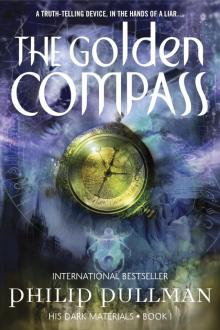 The Golden Compass
The Golden Compass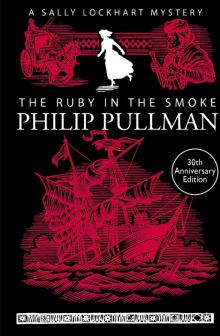 The Ruby in the Smoke
The Ruby in the Smoke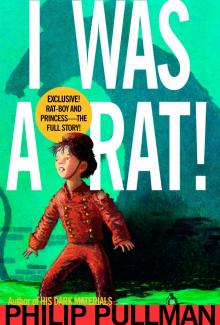 I Was a Rat!
I Was a Rat! Once Upon a Time in the North
Once Upon a Time in the North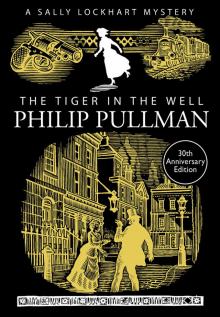 The Tiger in the Well
The Tiger in the Well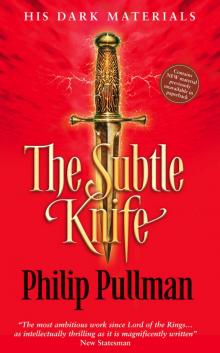 The Subtle Knife
The Subtle Knife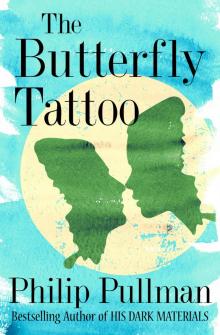 The Butterfly Tattoo
The Butterfly Tattoo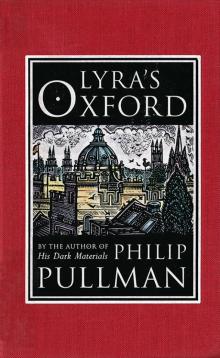 Lyra's Oxford
Lyra's Oxford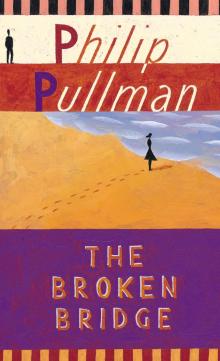 The Broken Bridge
The Broken Bridge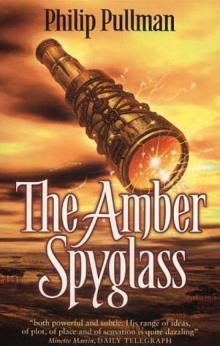 The Amber Spyglass
The Amber Spyglass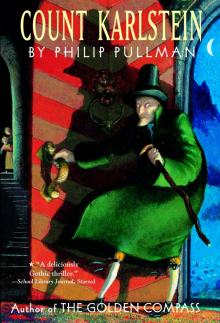 Count Karlstein
Count Karlstein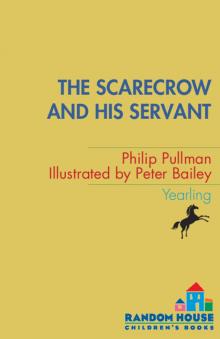 The Scarecrow and His Servant
The Scarecrow and His Servant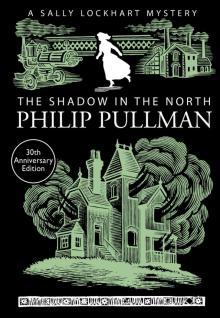 The Shadow in the North
The Shadow in the North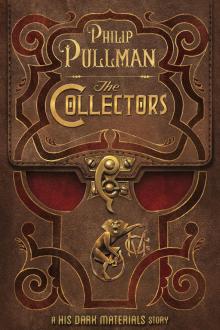 The Collectors
The Collectors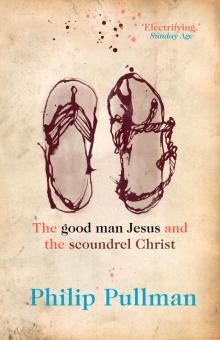 The Good Man Jesus and the Scoundrel Christ
The Good Man Jesus and the Scoundrel Christ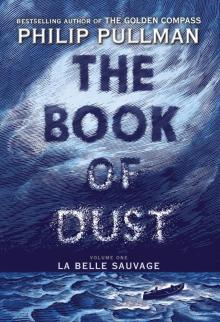 La Belle Sauvage
La Belle Sauvage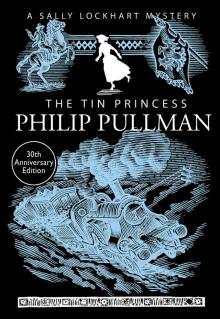 The Tin Princess
The Tin Princess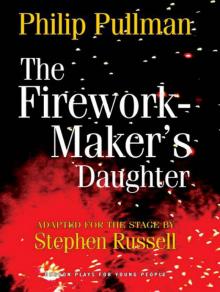 The Firework-Maker's Daughter
The Firework-Maker's Daughter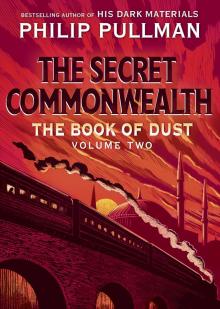 The Book of Dust: The Secret Commonwealth (Book of Dust, Volume 2)
The Book of Dust: The Secret Commonwealth (Book of Dust, Volume 2)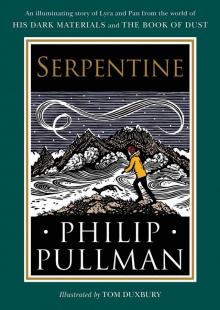 Serpentine
Serpentine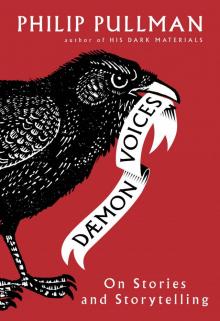 Daemon Voices
Daemon Voices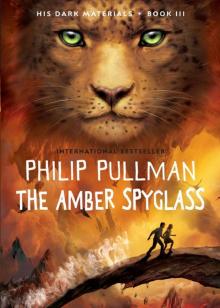 The Amber Spyglass: His Dark Materials
The Amber Spyglass: His Dark Materials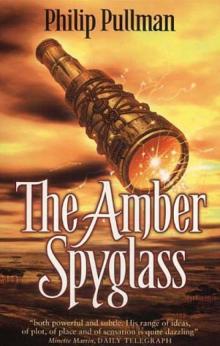 The Amber Spyglass hdm-3
The Amber Spyglass hdm-3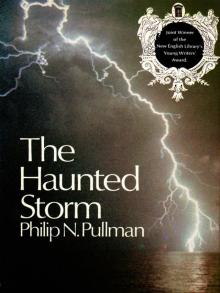 The Haunted Storm
The Haunted Storm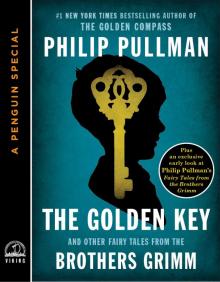 The Golden Key
The Golden Key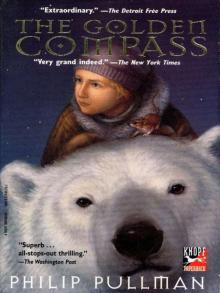 His Dark Materials 01 - The Golden Compass
His Dark Materials 01 - The Golden Compass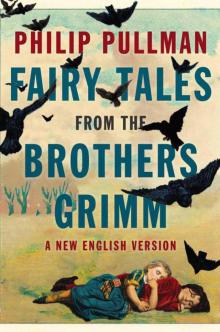 Fairy Tales from the Brothers Grimm: A New English Version
Fairy Tales from the Brothers Grimm: A New English Version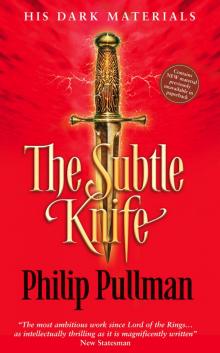 His Dark Materials 02 - The Subtle Knife
His Dark Materials 02 - The Subtle Knife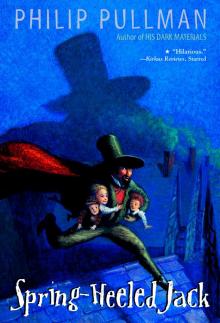 Spring-Heeled Jack
Spring-Heeled Jack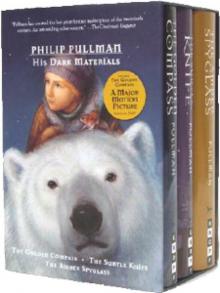 The Golden Compass hdm-1
The Golden Compass hdm-1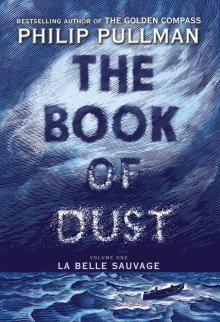 The Book of Dust, Volume 1
The Book of Dust, Volume 1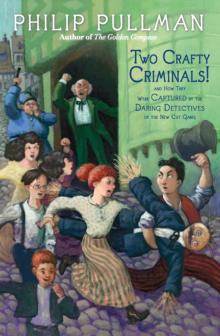 Two Crafty Criminals!
Two Crafty Criminals!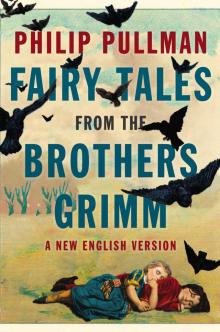 Fairy Tales from the Brothers Grimm
Fairy Tales from the Brothers Grimm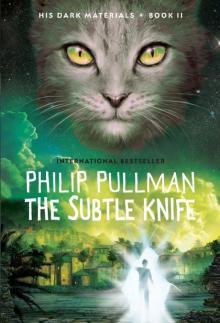 The Subtle Knife: His Dark Materials
The Subtle Knife: His Dark Materials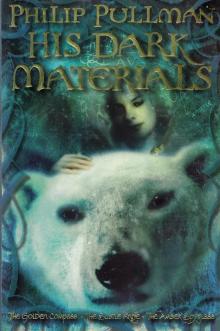 His Dark Materials Omnibus
His Dark Materials Omnibus The Golden Compass: His Dark Materials
The Golden Compass: His Dark Materials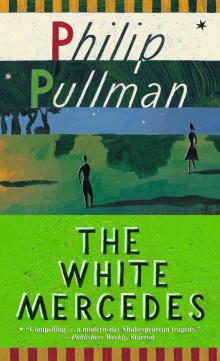 The White Mercedes
The White Mercedes